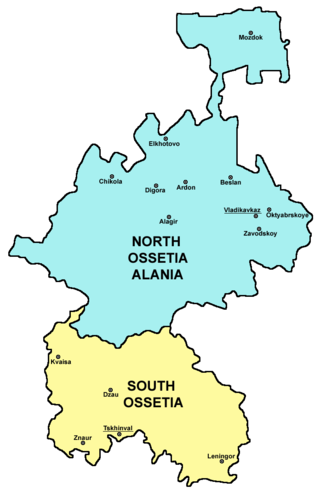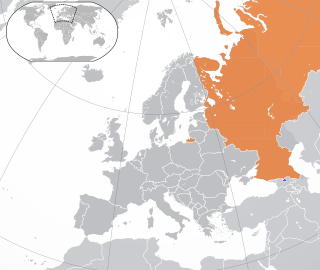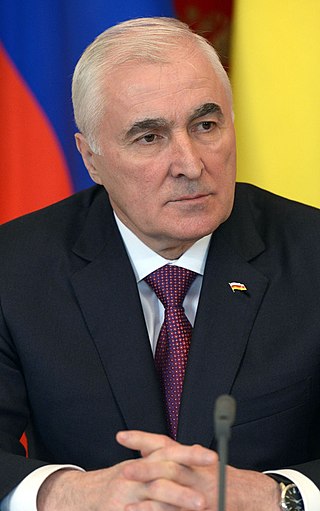
North Ossetia, officially the Republic of North Ossetia–Alania, is a republic of Russia situated in the North Caucasus of Eastern Europe. Its population according to the 2021 Census was 687,357. The republic's capital city is the city of Vladikavkaz, located on the foothills of the Caucasus Mountains.

Ossetia is an ethnolinguistic region located on both sides of the Greater Caucasus Mountains, largely inhabited by the Ossetians. The Ossetian language is part of the Eastern Iranian branch of the family of Indo-European languages. Most countries recognize the Ossetian-speaking area south of the main Caucasus ridge as lying within the borders of Georgia, but it has come under the control of the de facto government of the Russian-backed Republic of South Ossetia – the State of Alania. The northern portion of the region consists of the Republic of North Ossetia-Alania within the Russian Federation.

South Ossetia, officially the Republic of South Ossetia – the State of Alania, is a partially recognised landlocked state in the South Caucasus. It has an officially stated population of just over 56,500 people (2022), who live in an area of 3,900 square kilometres (1,500 sq mi), with 33,000 living in the capital city, Tskhinvali.

Eduard Dzhabeyevich Kokoyty is an Ossetian politician who served as President of the partially recognized state of South Ossetia from 2001 to 2011.

The republics of Russia are 21 territories in Russia that each constitute a federal subject, the highest-level administrative division of Russian territory. They are one of several types of federal subject in Russia. The republics were originally created as nation states for ethnic minorities. The indigenous ethnic group that gives its name to the republic is referred to as the titular nationality. However, due to centuries of Russian migration, each nationality is not necessarily a majority of a republic's population.

The Georgian–Ossetian conflict is an ethno-political conflict over Georgia's former autonomous region of South Ossetia, which evolved in 1989 and developed into a war. Despite a declared ceasefire and numerous peace efforts, the conflict remained unresolved. In August 2008, military tensions and clashes between Georgia and South Ossetian separatists erupted into the Russo-Georgian War. Since then, South Ossetia has been under Russian occupation.

South Ossetia, a mostly unrecognized republic in the South Caucasus, formerly the South Ossetian Autonomous Oblast within the Georgian Soviet Socialist Republic with its capital in Tskhinvali, held a referendum on independence on November 12, 2006.

The Administration of the temporary administrative-territorial unit on the territory of the former South Ossetia Autonomous District, shortly known as the Provisional Administration of South Ossetia, is an administrative body that Georgia regards as the legal government of South Ossetia. The administration was set up by the Georgian government as a transitional measure leading to the settlement of South Ossetia's status. The area lies within the territory of the former South Ossetian Autonomous Oblast which was abolished by the Georgian government in 1990. Since then South Ossetia has no autonomous status within Georgia.

The 2008 Russo-Georgian War was a war between Georgia, on one side, and Russia and the Russian-backed self-proclaimed republics of South Ossetia and Abkhazia, on the other. The war took place in August following a period of worsening relations between Russia and Georgia, both formerly constituent republics of the Soviet Union. The fighting took place in the strategically important South Caucasus region. It is regarded as the first European war of the 21st century.

This article describes the background of the Russo-Georgian War.

Abkhazia and South Ossetia are disputed territories in the Caucasus. Most countries recognise them as part of Georgia, while Russia, Venezuela, Nicaragua, Nauru, and Syria regard them as independent. Russia's initial recognition of the independence of Abkhazia and South Ossetia occurred in the aftermath of the Russo-Georgian War in 2008. The government of Georgia considers the republics to be Russian-occupied territories.

Russia–South Ossetia relations refers to the bilateral relationship between Russia and the Republic of South Ossetia, a disputed region in the South Caucasus, located on the territory of the South Ossetian Autonomous Oblast within the former Georgian Soviet Socialist Republic.
Aslanbek Soltanovich Bulatsev is an Ossetian politician and official. Bulatsev formerly worked as a tax chief in the Russian region of North Ossetia. On October 22, 2008, he was appointed Prime Minister of the Republic of South Ossetia by the South Ossetian parliament. Bulatsev was fired, according to the official decree, on health reasons, on 4 August 2009. He was replaced by Vadim Brovtsev, the head of a Russian construction company.

Vadim Vladimirovich Brovtsev is a Russian businessman who was Prime Minister of the Republic of South Ossetia from 5 August 2009 to 26 April 2012, as well as Acting President from December 11, 2011, to April 19, 2012.

Presidential elections were held in South Ossetia on 13 November 2011. A referendum was held on the same day. A run-off was held on 27 November, but the result were invalidated by the Supreme Court of South Ossetia. A new election was scheduled for 25 March 2012.

Anatoly Ilyich Bibilov is a South Ossetian military officer, was the 4th President of South Ossetia. He succeeded Leonid Tibilov as president on 21 April 2017 to 24 May 2022, following his election victory, but was defeated by Alan Gagloev in the 2022 election.

Leonid Kharitonovich Tibilov is a South Ossetian politician who served as the President of South Ossetia from 2012 to 2017 after winning the 2012 South Ossetian presidential election.

A referendum on changing the territory's name was held in South Ossetia on 9 April 2017, alongside presidential elections. It was approved by 79.53%. The constitution will be amended to denominate the formal name of the country from "Republic of South Ossetia" to "Republic of South Ossetia–the State of Alania", referencing Alania, a state built by the Alan people. Modern Ossetians are descended from the Alans, although the name Ossetian is of Georgian origin.
South Ossetia is an autonomous region in Georgia, approximately 1,000 metres (3,300 ft) above sea level on the slopes of the Greater Caucasus. Although it declared independence in 2008, only a few countries acknowledge it. The region is inhabited by Ossetians, an Iranian ethnic group. According to Russia, Nicaragua, Venezuela, Syria and Nauru, it is one of the world's newest independent states. All other states and international organisations consider South Ossetia an autonomous region of Georgia, functioning as a de facto state for twenty years after declaring independence and conducting a successful armed rebellion. Its Georgian inhabitants have been displaced. South Ossetia has been a source of tension for a number of years, with Georgia and Russia's political differences impeding peaceful independence and breeding a turbulent series of events which undermine the Universal Declaration of Human Rights.

South Ossetia is a partially recognized and Russian-occupied separatist state internationally recognized as part of Georgia. It is mainly inhabited by Ossetians, an ethnic group also dominant in North Ossetia, which is part of Russia. South Ossetia separated itself from Georgia following the 1991–1992 South Ossetia War with the help of Russia, remaining ever since as a state closely allied with this country.















